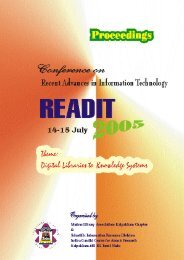READIT-2007 - Indira Gandhi Centre for Atomic Research
READIT-2007 - Indira Gandhi Centre for Atomic Research
READIT-2007 - Indira Gandhi Centre for Atomic Research
Create successful ePaper yourself
Turn your PDF publications into a flip-book with our unique Google optimized e-Paper software.
capacity database servers (MS SQL Server 2000) multiprocessor workstations,<br />
scanners, printers, data analysis software, security gadgets and applications…<br />
Knowledge Resources and Services<br />
University Libraries usually known <strong>for</strong> their archives of print collection are<br />
slowly building up their digital backfiles to cater to their clientele needs. The concept<br />
of serving as Knowledge Centers has warranted them to acquire electronic resources<br />
of e-books, e-journals, e-databases, e-theses, e-reference works… organize them to<br />
track specific in<strong>for</strong>mation to provide reference <strong>for</strong> researchers and others who do not<br />
have time to do the work themselves.<br />
They also design, compile and build up value-added services such as Subject<br />
Gateways on specific themes such as eg: <strong>Research</strong> funding and writing proposals,<br />
Nanotechnology Gateway and so on.<br />
The Library besides being used in the traditional sense is used more as a<br />
Center where the researcher looks up <strong>for</strong> resources made available at one’s desktop<br />
24x7. The center also faces the challenge of furnishing e-modules of in<strong>for</strong>mation<br />
literacy catering to users in the virtual environment with distributed learning in<br />
process.<br />
Another challenge is planning to reach out to users in new ways. Interacting<br />
with the users face to face has been dwindling down, as many a time transactions<br />
occur over the web. With the website becoming the library <strong>for</strong> many of the patrons if<br />
has become crucial to redouble its ef<strong>for</strong>ts to disseminate knowledge through various<br />
access methods. Major role of the center is to sieve through the ‘infoglut’ gathered<br />
not only from internal but external sources stored at other library locations and<br />
organize the knowledge resources in the required <strong>for</strong>mat.<br />
The Knowledge Commission of India also proposes to create/identify<br />
Knowledge Centers with the support of Govt. of India and state governments and<br />
network these knowledge Gateways which could become the National Knowledge<br />
Gateway in future.<br />
3. KNOWLEDGE ENGINEERS OR KNOWLEDGE WORKERS<br />
Traditional capabilities and training to be custodians of books and maintaining<br />
them have changed the librarians to compete in today’s Knowledge economy<br />
increasingly warranting mastery of complex skills.<br />
The level of “in<strong>for</strong>mation skills” with the ability to filter out in<strong>for</strong>mation may<br />
be one of the primary ingredient of a successful knowledge worker. He/She requires<br />
varying depths of knowledge in particular areas (Skyrme 1998) such as<br />
• Technical Skills - in<strong>for</strong>mation (resources) management,<br />
in<strong>for</strong>mation technology skills.<br />
• Business Knowledge - industry, markets, customers,<br />
competitors and general<br />
business context.<br />
• Interpersonal skills - networking, listening, interpreting,<br />
challenging, teamwork,<br />
communications.<br />
45

















